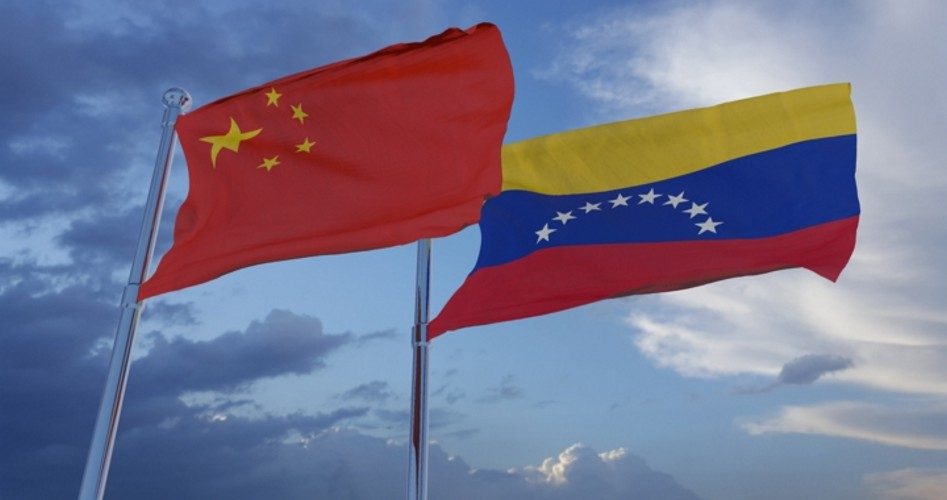
Publicly, Russia and China continue to support Venezuela’s embattled Marxist leader, Nicolás Maduro. But privately they are moving to cut their losses as his exit appears more likely and more imminent.
Right after President Trump announced White House support for Maduro’s opponent, Juan Guaidó, Russian President Vladimir Putin called Maduro to express his support. At the same time, Putin said that Trump’s “destructive external interference is a gross violation of the fundamental norms of international law.”
A few days, later Putin sent about 400 Russian “military advisors” to Venezuela, allegedly to confirm his country’s support for Maduro’s failing regime. At the time, we suggested that “rather than providing support, they were there to monitor Maduro’s behavior as his regime descends into chaos and to embed themselves into the new government upon Maduro’s exit.”
Putin has a lot to lose. As a writer for the Council on Foreign Relations noted last week: “Russia is Venezuela’s largest supplier of weapons, having sold the country more than $10 billion in hardware since the mid-2000s, including assault rifles, jet fighters, tanks, and missile systems. The two nations also conduct joint military exercises, and Russian jets and warships make regular stopovers. In a recent show of force, two Russian bombers capable of carrying nuclear weapons visited Venezuela.”
In addition Russia has been, until very recently, a lender of last resort for Maduro:
In late 2017, Moscow bailed Venezuela out by restructuring more than $3 billion in sovereign debt, which allowed the Maduro government to meet its obligations to other creditors.
Meanwhile, Russia’s state-backed oil giant, Rosneft, is one of Venezuela’s largest foreign backers, loaning it roughly $2.5 billion in recent years in exchange for future energy shipments.
Rosneft also co-owns several oil and gas projects with PDVSA, Venezuela’s state energy company — which was just sanctioned by the United States — and it has a 49 percent stake in Citgo, PDVSA’s U.S. refining arm.
This pales when compared to the investments China has made in Venezuela, securing repayment in discounted oil and gaining a political foothold in America’s backyard. According to the Center for Strategic and International Studies in Washington, Beijing has extended $55 billion in energy-related loans, not including the $5 billion credit line it extended in September 2018.
Chinese Foreign Ministry spokesman Geng Shuang, when asked about the deteriorating situation in Venezuela, was very careful with his words. He said that Beijing “maintains close contact with all parties through various means” adding that “no matter what the situation may involve, our cooperation should not be harmed.”
That was the public face put on private concerns over Maduro’s increasingly desperate financial condition and just how the new administration would treat that $60 billion Venezuela owes China. China’s Commerce Ministry reported on January 29: “If the opposition party holds power in the future, a new Venezuelan government could use ‘protecting national interests’ as a reason to renegotiate contract terms with China [or] even just refuse to repay remaining debts.”
That’s the background for those “debt renegotiations” currently taking place in Washington with representatives of Juan Guaidó. Evan Ellis, an expert on Chinese relations in Latin America at the U.S. Army War College, said that “China recognizes the increasing risk of a regime change and does not want to be on the bad side of the new regime.”
When Kremlin spokesman Dmitry Peskov was asked about the deteriorating situation in Venezuela, Peskov also was very careful in his selection of words: Russia, he said, is “interested in maintaining and improving good relations with Venezuela,” neatly omitting any mention of just whom those “good relations” would be with.
China has more to lose than Russia. Its relations with the United States have soured on a number of issues, from trade to cyberhacking to confrontations with U.S. military warships in the South China Sea. Its support for Maduro also risks alienating the South American countries that have expressed support for Guaidó and undermines the image Beijing has been cultivating as a benign source of financial and technical support for other developing nations in Latin America.
Both Russia and China have recognized the new reality in Venezuela, and are working to cut their losses by establishing working relations with Guaidó’s nascent administration.
Image: themotioncloud via iStock / Getty Images Plus
An Ivy League graduate and former investment advisor, Bob is a regular contributor to The New American and writes primarily on economics and politics. He can be reached at [email protected].
Related article:



